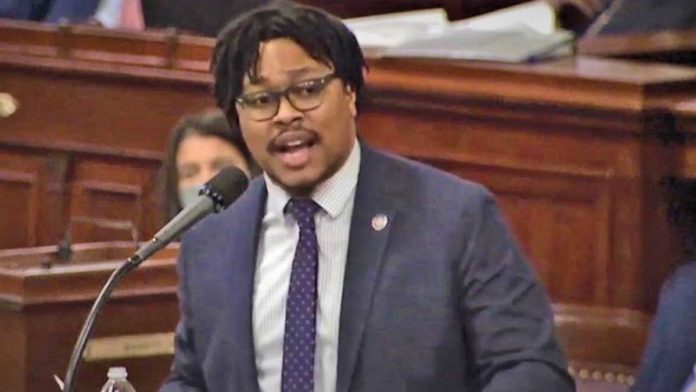“At every [church] service and at my school and on TV and in the law, I was always told implicitly and explicitly that who I was was not an option,” said out Rep. Malcolm Kenyatta on the floor of the Pennsylvania House of Representatives last week, “Those messages left me feeling powerless to muster the courage, Mr. Speaker, to ever say publicly that I was gay.” This was the second time in two days that Kenyatta introduced an anti-discrimination amendment, signaling his larger strategy to secure protections for LGBTQ folks.
On May 20, Kenyatta spoke out in defense of an amendment to Bill 2489 which would allow public gathering outdoors; Kenyatta’s amendment was to prevent discrimination based on sexual orientation or gender identity. In order to convey the underlying spirit of equality, Kenyatta told his personal coming out story and reminded the legislators of what his amendment was really about. “This amendment is not just about fairs or arboretums,” he said, “it’s really about the message we are sending to young people from this body about whether or not who they are is acceptable. Whether or not who they are is worthy of shame. Whether or not they should just come to accept as normal the discrimination that LGBTQ folks so often feel in the Commonwealth. We’re telling them that in America, in the Commonwealth that’s supposed to be a beacon of fairness and of freedom, that who they are makes them less than. And that if they become a target of discrimination, oh well. That’s what we’re saying to them.”
Executive Director of the Bradbury-Sullivan LGBT Community Center Adrian Shanker said, “It was an incredibly powerful speech and reaffirms the importance of having LGBTQ people elected and able to share our stories and our experiences. Rep. Kenyatta spoke from the heart and that was very powerful for LGBTQ people across Pennsylvania to see.”
Reflecting later, Kenyatta said, “That was one of the toughest speeches I’ve ever given. I’ve never really talked publicly about my coming out story. I think there are a lot of people who can relate to that experience. It was scary, but it’s a lot scarier for a young queer kid who is going through that right now.”
Though both amendments received bipartisan support, Kenyatta’s first proposed amendment missed passage by a majority of only two votes. The second was barred from a vote due to a “procedural tactic,” according to Kenyatta. Kenyatta said that Republican majority leader Bryan Cutler argued that the amendment was not germane to the bill and made the point that it was considered germane two days prior when over a hundred people voted for progress.
As of press time, Cutler could not be reached for comment.
While neither amendment passed, Kenyatta’s efforts shed a harsh light on the positions of all state representatives concerning LGBTQ protections. Shanker said, “The members of the Pennsylvania House are now on record about nondiscrimination with an up or down vote. This, for many legislators, is the first time they gave an up or down vote on any LGBTQ issue. We now have a voting record, and that’s very significant. It’s important that LGBTQ people in Pennsylvania know the facts about where our elected legislators stand on our issues. That’s not a matter of opinion, it’s not a matter of partisanship, it’s a matter of fact because a voting record is a public document.”
“It’s the closest we’ve ever gotten,” said Kenyatta with a hopeful note, “Elected officials who voted the incorrect way need to think about the fact that there’s an election coming up. Voters need to make this a priority in terms of how they’re considering who they’ll support. If folks don’t support [anti-discrimination], they need to be voted out and replaced by somebody who truly believes in human rights, truly believes in fairness, truly believes that we can have a legal system in Pennsylvania that is equal.”
